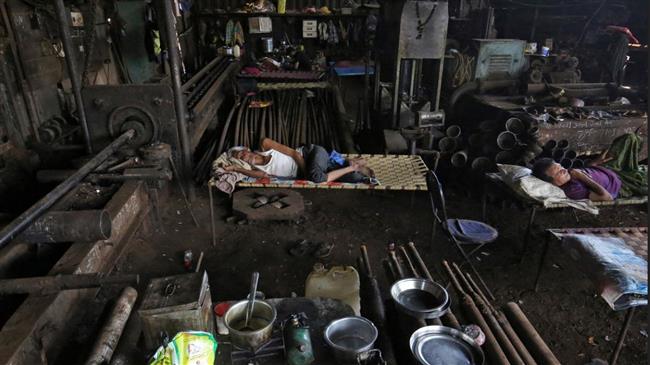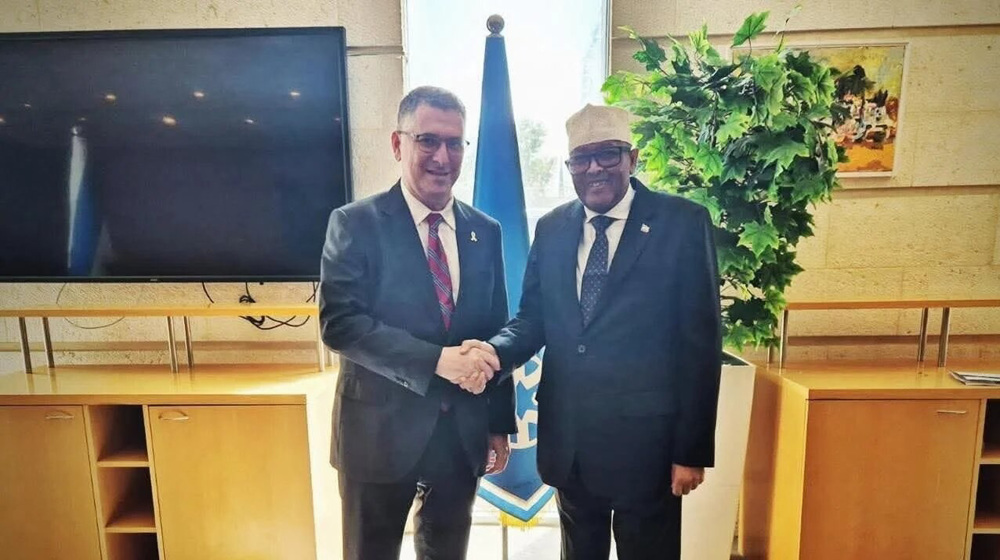Half a billion people likely plunge into poverty by COVID-19 pandemic: Oxfam
The new COVID-19 pandemic can push some half a billion people across the globe into poverty, Oxfam says, as the contagious disease is raging around the world, taking more lives and wreaking havoc on economies.
In a report on Thursday, the Kenya-based charity organization assessed the fallout from the coronavirus spread on global poverty due to shrinking household incomes or consumption.
“The economic crisis that is rapidly unfolding is deeper than the 2008 global financial crisis. The estimates show that, regardless of the scenario, global poverty could increase for the first time since 1990,” the report found.
The report, which came out a few days ahead of the joint annual meeting of the International Monetary Fund (IMF) and the World Bank, added that such dramatic impact could plunge certain countries back to poverty last seen three decades ago.
The COVID-19 disease, caused by a new coronavirus, was first detected in the Chinese city of Wuhan late last year and is currently affecting 209 countries and territories across the globe. It has so far affected more than 1,537,500 people and killed over 89,950.
The World Health Organization (WHO) has declared the outbreak a global pandemic.
The authors of the Oxfam report developed several scenarios, taking into account the World Bank's different poverty lines - from severe poverty, defined as living on $1.90 a day or less, to higher poverty lines of living on less than $5.50 a day.
Under the most serious scenario, which sees a 20 percent contraction in income, 431 million more people to nearly 1.2 billion across the world will plunge into extreme poverty. According to the same scenario, the number of people living below the $5.50 a day threshold will rise by 548 million people to nearly 4 billion.
Oxfam, a confederation of 19 independent charitable organizations focusing on the alleviation of global poverty, also predicted that women are at more risk than men, as they are more likely to work in the informal economy with little or no employment rights.
“Living day to day, the poorest people do not have the ability to take time off work, or to stockpile provisions,” the report further warned, noting that over two billion informal sector workers globally have no access to sick pay.
Last week, the World Bank warned that poverty in East Asia and the Pacific region alone could soar by 11 million people if conditions worsened.
To help alleviate the impact of COVID-19 pandemic, Oxfam proposed a six-pint action plan that would provide people and businesses in need with cash grants and bailouts. The plan also called for debt cancellation, more IMF support, and increased aid.
According to Oxfam plan, taxing wealth, extraordinary profits, and speculative financial products would also help increase the funds needed.
The report further said that governments across the globe would need to mobilize at least $2.5 trillion in total to help developing nations.
“Rich countries have shown that at this time of crisis they can mobilize trillions of dollars to support their own economies. Yet unless developing countries are also able to fight the health and economic impacts the crisis will continue and it will inflict even greater harm on all countries, rich and poor,” it added.
Pandemic may cause Africa's 1st recession in 25 years
The World Bank warned Thursday that sub-Saharan Africa could slip into its first recession in a quarter of century because of the coronavirus pandemic on the world's most impoverished continent.
"We project that economic growth in Sub-Saharan Africa will decline from 2.4 percent in 2019 to 2.1 to -5.1 percent in 2020, the first recession in the region in 25 years," the Bank said in an assessment.
The virus has arrived late in Africa compared to elsewhere but is spreading rapidly in some countries, and the continent is highly vulnerable to declining trade and tourism as well as falling prices for oil and mineral exports, it said.
"The COVID-19 pandemic is testing the limits of societies and economies across the world, and African countries are likely to be hit particularly hard," said Hafez Ghanem, the Bank's vice president for Africa. The impact on African countries will vary, the twice-yearly economic update report said.
It warned, however, that real gross domestic product was forecast to "fall sharply" in the three largest economies -- Nigeria, South Africa and Angola -- because of "persistently weak growth and investment" and declining commodity prices.
The continent's most industrialized country, South Africa, slipped into recession in the final quarter of 2019 and has posted its weakest growth rates ever in the past five years -- never exceeding 1.3 percent and in some years falling below one percent.
'Catastrophic'
The collapse in oil prices "is catastrophic" for public finances in the continent's leading crude producers of Nigeria and Angola, said Albert Zeufack, the Bank's chief economist for Africa.
"We are living in unprecedented times," Zeufack said. "The world has not seen this since World War II," he said during a briefing streamed from Washington.
"This is going to be the deepest recession globally but also affecting Africa, and the reason why this is so serious is because it is not just a health crisis, it's a health crisis that's going to be combined with an economic crisis and potentially a food crisis in African countries."
While governments are taking varying steps to deal with the economic fallout of the pandemic, the bank says African countries will inevitably require debt relief.
"There is no doubt there will be need for some sort of debt relief from bilateral creditors to secure the resources urgently needed to fight COVID-19 and to help manage or maintain macroeconomic stability in the region," said Cesar Calderon, economist and lead author of the report.
The Bank said it will giving out up to $160 billion in financial support over the next 15 months to help countries protect the vulnerable, support businesses and shore up economic recovery.
The pandemic will also worsen food shortages on a continent already grappling with drought, locust invasions conflict and violence, the Bank said.
Domestic currencies are losing value while prices of staple foods are rising in many parts of the continent.
The UN World Food Program (WFP) said Wednesday that since December, hundreds of thousands more people had already slipped into the severely hungry category in Zimbabwe, where more than half of the population faces hunger.
One hundred Italian doctors have died of COVID-19
One hundred Italian doctors have died of the novel coronavirus since the pandemic reached the Mediterranean country in February, Italy's FNOMCeO health association said on Thursday.
"The number of doctors who have died because of COVID-19 is 100 -- perhaps even 101 at the moment, unfortunately," a FNOMCeO spokesman told AFP.
The toll includes retired doctors the government began calling in a month ago to help fight a coronavirus that has officially claimed a world-topping 17,669 lives in Italy.
Italian media reports estimate that 30 nurses and nursing assistance have also died of COVID-19.
"We can longer allow our doctors, our health workers, to be sent to fight without any protection against the virus," FNOMCeO president Filippo Anelli said on the association's website.
"It is an unfair fight," Rome's ISS public health institute estimates that 10 percent of those infected with the novel coronavirus in Italy work in health care.
Bangladesh Nationalist Party secures victory in general election
VIDEO | British High Court rules against ban on Palestine Action Group
Tehran urges ‘serious’ revision in EU ‘unconstructive’ approaches
Hamas slams Israeli settlers’ ‘criminal aggression’ in West Bank
VIDEO | Press TV's news headlines
VIDEO | Iran launches 'Holy Qur'an Does Not Burn' campaign to restore mosques damaged in unrest
VIDEO | Ramadan amid the rubble: Gaza’s historic Al-Zawiya market defies odds
UN sounds alarm over US-generated energy crisis in Cuba













 This makes it easy to access the Press TV website
This makes it easy to access the Press TV website